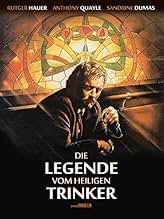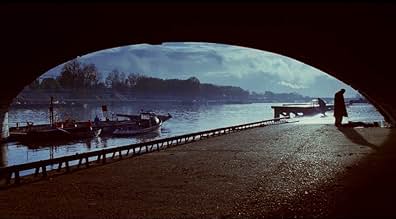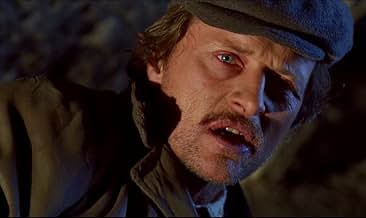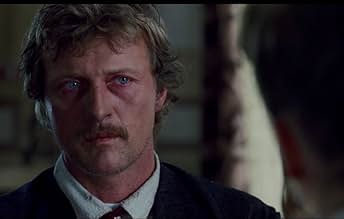NOTE IMDb
7,1/10
2,4 k
MA NOTE
Un sans-abri alcoolique se voit remettre deux cents francs par un étranger, qui lui demande de rendre l'argent à Sainte Thérèse dans la cathédrale lorsqu'il le pourra.Un sans-abri alcoolique se voit remettre deux cents francs par un étranger, qui lui demande de rendre l'argent à Sainte Thérèse dans la cathédrale lorsqu'il le pourra.Un sans-abri alcoolique se voit remettre deux cents francs par un étranger, qui lui demande de rendre l'argent à Sainte Thérèse dans la cathédrale lorsqu'il le pourra.
- Réalisation
- Scénario
- Casting principal
- Récompenses
- 12 victoires et 3 nominations au total
Francesco Aldighieri
- Policeman
- (as Franco Aldighieri)
Avis à la une
10duinnuk2
This simple tale is told at a pace which allows the audience time to reflect within the context of the moral challenges it presents. The result is a level of engagement far superior to the gamut of empty sophistication in the movie world. One is able to explore the implications of the actions and decisions of Hauer's character without leaving the narrative - there is no pressure for post viewing reflection when the spell of the film is broken and thought is coloured by a context inappropriate to the narrative. Here is a complete experience - moving, profound and visually beautiful - if only Hollywood could produce cinema of this standard.
Dutch actor, Rutger Hauer plays the role of a Catholic-Pole and tramp - Andreas Kartack, living in penury in a a timeless Paris. He is approached by a generous dapper gentleman (English actor Anthony Quayle) who gives him 200 francs as long as he donates part of it to a local chapel. An ex-coal miner, in appearance, Kartack sports 'over the ears' wavy fair hair, rheumy eyes, a thin moustache and those tell-tale signs of the coal-mining trade - a rough tough job to say the least- a flat-cap and coal-dust underneath his fingernails. There are shots of him in a Polish mine-shaft and pit-village in an earlier life. He finds work, the company of women and companionship with fellow Poles but is let down by his alcoholism if not sense of stupidity. Based on Lemberg-born Jewish writer Joseph Roth's novel, why the film is poignant is hard to describe - perhaps relating to Slavs/East Europeans exiled from their homelands. The film has a rich spiritual feel, in fact it has that sense of art and spirituality seen in Dostoyevsky's novel, 'The Idiot' featuring the saintly epileptic Prince Leo or Tarkovsky's moving, 'Nostalghia' (1983). Paris seems like an organically glamourous city . For me, this is Hauer's finest performance after his role as the fair-haired French free spirit, Claude Maillot-Van Horn in Roeg's 'Eureka' (1983).
For me it's odd that the characters speak in English in Paris, and I feel it's not a smooth transition from the setting of the original novel. Some of the English dialogues are dubbed and have strange intonations that Ermanno Olmi would not have noticed. The Italian version of this would be more even, I imagine.
So many Italian films have been ruined by bad American dubbing, or Italian dialogue where it should have been English (for example Liliana Cavani's The Skin where Burt Lancaster who is an American officer speaks Italian) and some have benefitted from being shot in English like The Night Porter, where Dirk Bogarde refused to count and insisted on film being shot in English. This is not one of those successful ones though and I think it didn't do as well in the US or UK as it did in Italy for that reason.
So many Italian films have been ruined by bad American dubbing, or Italian dialogue where it should have been English (for example Liliana Cavani's The Skin where Burt Lancaster who is an American officer speaks Italian) and some have benefitted from being shot in English like The Night Porter, where Dirk Bogarde refused to count and insisted on film being shot in English. This is not one of those successful ones though and I think it didn't do as well in the US or UK as it did in Italy for that reason.
Takeaway Scene
Rutger Hauer's biggest, joyful smile is for a bathtub.
The Good This is one of very few successful screen transpositions of an introspective literary work. The dialogue is sparse and in two languages but the film while making small adjustments here and there conveys all the internal monologue of Joseph roth's novella. Hauer. Probably his best performance (although I also like his understated character in lady Hawke). He is the icon of a getleman drunk. The photography. natural, unobtrusive, realistic. The cast: A very heterogeneous looking cast that manages to fit in well and act natural in their respective roles. The women: For a very Catholic director, Olmi is very kind to almost the women in the movie, including extras, and they look attractive without losing their real, unpolished authenticit
The Not So Good The film is almost real time,with long contemplative moments, to the point that sometimes the flashbacks have more action that the main scene. For all its photographical and acting beauty, the going can be slow, and watching Hauer drinking one longs to join in. I haven't counted them, but I suspect that matching the movie glass for glass would be lethal (especially the Cafe'-Calva followed by an Absinthe in the morning)
The Strange Hauer is a character living and dressing in the 1930s filmed in 1980s Paris. And it fits seamlessly, the same way that the real, surviving old bistrots and locations fit in their modern surroundings. Olmi has taken advantage of a phenomenon familiar to us all walking in cities and performed a sleight of hand trick, aided by the costume design of Ms. Marchand that emphasizes the continuity between periods to blend characters in.
The Good This is one of very few successful screen transpositions of an introspective literary work. The dialogue is sparse and in two languages but the film while making small adjustments here and there conveys all the internal monologue of Joseph roth's novella. Hauer. Probably his best performance (although I also like his understated character in lady Hawke). He is the icon of a getleman drunk. The photography. natural, unobtrusive, realistic. The cast: A very heterogeneous looking cast that manages to fit in well and act natural in their respective roles. The women: For a very Catholic director, Olmi is very kind to almost the women in the movie, including extras, and they look attractive without losing their real, unpolished authenticit
The Not So Good The film is almost real time,with long contemplative moments, to the point that sometimes the flashbacks have more action that the main scene. For all its photographical and acting beauty, the going can be slow, and watching Hauer drinking one longs to join in. I haven't counted them, but I suspect that matching the movie glass for glass would be lethal (especially the Cafe'-Calva followed by an Absinthe in the morning)
The Strange Hauer is a character living and dressing in the 1930s filmed in 1980s Paris. And it fits seamlessly, the same way that the real, surviving old bistrots and locations fit in their modern surroundings. Olmi has taken advantage of a phenomenon familiar to us all walking in cities and performed a sleight of hand trick, aided by the costume design of Ms. Marchand that emphasizes the continuity between periods to blend characters in.
A great tale with a brillant Rutger Hauer and fatastic music by Igor Stravinsky!
Le saviez-vous
- AnecdotesRobert De Niro was approached for the role of Andreas Kartak, but he turned down the offer because he was not convinced about the project.
- ConnexionsFeatured in Het uur van de wolf: Rutger Hauer: Blond, blue eyes (2006)
Meilleurs choix
Connectez-vous pour évaluer et suivre la liste de favoris afin de recevoir des recommandations personnalisées
- How long is The Legend of the Holy Drinker?Alimenté par Alexa
Détails
- Date de sortie
- Pays d’origine
- Langues
- Aussi connu sous le nom de
- The Legend of the Holy Drinker
- Lieux de tournage
- Sociétés de production
- Voir plus de crédits d'entreprise sur IMDbPro
Box-office
- Montant brut mondial
- 6 384 $US
- Durée2 heures 8 minutes
- Couleur
- Mixage
- Rapport de forme
- 1.85 : 1
Contribuer à cette page
Suggérer une modification ou ajouter du contenu manquant

Lacune principale
What is the German language plot outline for La légende du saint buveur (1988)?
Répondre






















